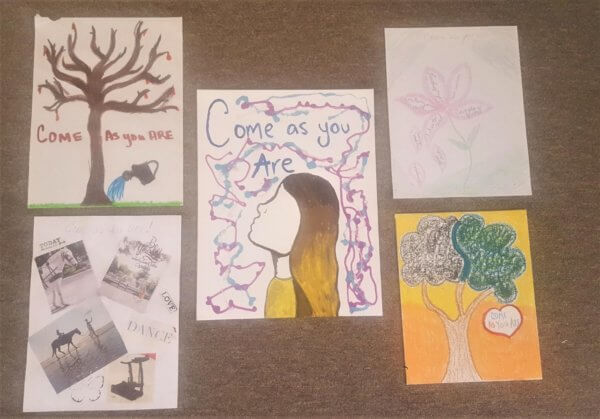Body image is often an incredibly overwhelming subject for individuals suffering from an eating disorder. Improving one’s body image is most often one of the last components of recovery from an eating disorder, making this topic very difficult to discuss. Many women with an eating disorder body check, especially after meals and snacks, further exacerbating a poor image of herself and her body. Helping our clients increase their insight into why and how they see themselves differently than others see them can be enlightening for them and helps them to move forward in their recovery.
At Magnolia Creek, we are passionate about encouraging our clients and lifting them up. Speaking life into them using affirming words is crucial to help them combat the negative things they have been told, often for many years. We have clients affirm themselves after every meal and snack (6x/day) to help them practice speaking positive things to themselves until they can see their bodies and minds in a more positive light. We also use several techniques in our group therapy sessions to increase understanding for what it means to love their bodies and to help them overcome the fears that are often associated with their eating disorder.
What does it mean to love your body?
Magnolia Creek honors National Eating Disorders Awareness Week and Love Your Body Month by taking time with clients to engage in artistic therapies surrounding what it means to love your body.
We discussed “20 Ways to Love your Body”, and clients were encouraged to share how they identified with each of the 20 statements. They were then asked to create an art project depicting the statement(s) that they identified with most. After this, clients then created individualized art projects incorporating the phrase, “Come as You Are” somewhere on the project, as this is the theme for the 2019 National Eating Disorder Awareness week.
In a previous Body Image Group, we asked clients “What does it mean to love your body?” and many became frustrated at the idea and displayed great difficulty in the assignment. Most of these women have spent years struggling with their bodies and body image to fight a deeper battle internally, making the frustration understandable.
“I saw the hesitation with many of them, but then something miraculous happened. Instead of tackling the assignment alone, they joined together against body image battles and created something beautiful,” shares one of our therapist.
The women at Magnolia Creek united against negative body image and opened their hearts and minds towards loving their bodies and advocating for this cause. We live in a society with a considerable amount of shame and negativity associated with body image. The media continuously pushes us to diet, tan, or alter our bodies with surgery or other drastic measures.
What would happen, if instead, the world promoted what the women of Magnolia Creek demonstrated?
- Take care of your body
- Nourish your body
- Embrace your beautifully unique qualities
- Stop focusing on comparing two bodies that were never meant to be the same
- Focus on happiness
- Treat yourself kindly
- Provide yourself and your body with loving affirmations
These are only a few of the amazing things our clients had to say about loving your body. Although they may not yet believe it for themselves, they realized they have the heart for those struggling with body image and maybe, they could begin loving their body day-by-day instead of plotting wars against it.
Our clients have asked if true recovery and embracing one’s body was a real possibility, and we can “yes”. Everyone’s journey with their body looks different, and for some, it may seem impossible to ever embrace and love their own body. Our clients, and all of Magnolia Creek is here to say YES, loving your body is achievable and each person is worthy of this.
It often does not happen in one day but taking time each day to practice being kind to your body can lead to renewed peace and love. It can be a simple as saying positive daily affirmations to yourself, wearing clothes to express yourself, choosing to honor your hunger and fullness cues, eating the cake and enjoying it, and reaching out for support.
How can we tackle our fears?
Our clients have tackled their fears in our Nutrition Group. In the first part of the challenge, our dietitians, Brittany Braswell and Leigh-Ann Bamberg, provided clients with a small piece of paper. On one side, each client wrote down a fear she wants to overcome – nutrition, food, eating disorder, or exercise related – on the opposite side, clients drew a simple picture or word depicting that fear, then shared with the group how she plans to conquer it.

While the cookies were baking and cooling, Brittany and Leigh-Ann reviewed S.M.A.R.T. goals, and each client came up with her own S.M.A.R.T. goal to help her in taking a step closer towards overcoming her fears. S.M.A.R.T. goals help to make a general goal specific and easy to evaluate its success, as well as barriers to success.
SMART stands for:
S – specific
M – measurable
A – attainable
R – realistic
T – time lined
Negative body image can have profound effects, such as eating disorders, depression, anxiety, substance abuse, and other significant health problems. Now is the time to start conversations about what it means to love your body, and move past the stigma surrounding eating disorders. We can be the change in our society and we can fight to promote a life where bodies are celebrated, not shamed.
If you or a loved one is suffering from an eating disorder, Magnolia Creek can help. For more information on our treatment program, call our admissions team at 205-409-4220 or complete our contact form.
________________________________________
And I said to my body softly, “I want to be your friend.” It took a long breath and replied, “I have been waiting my whole life for this.”





